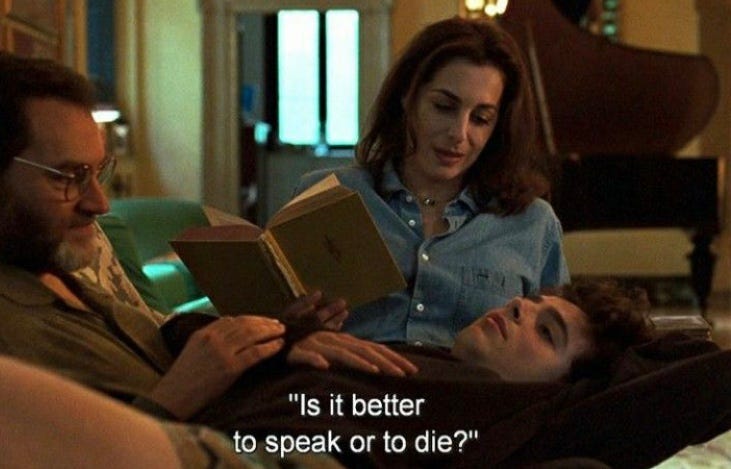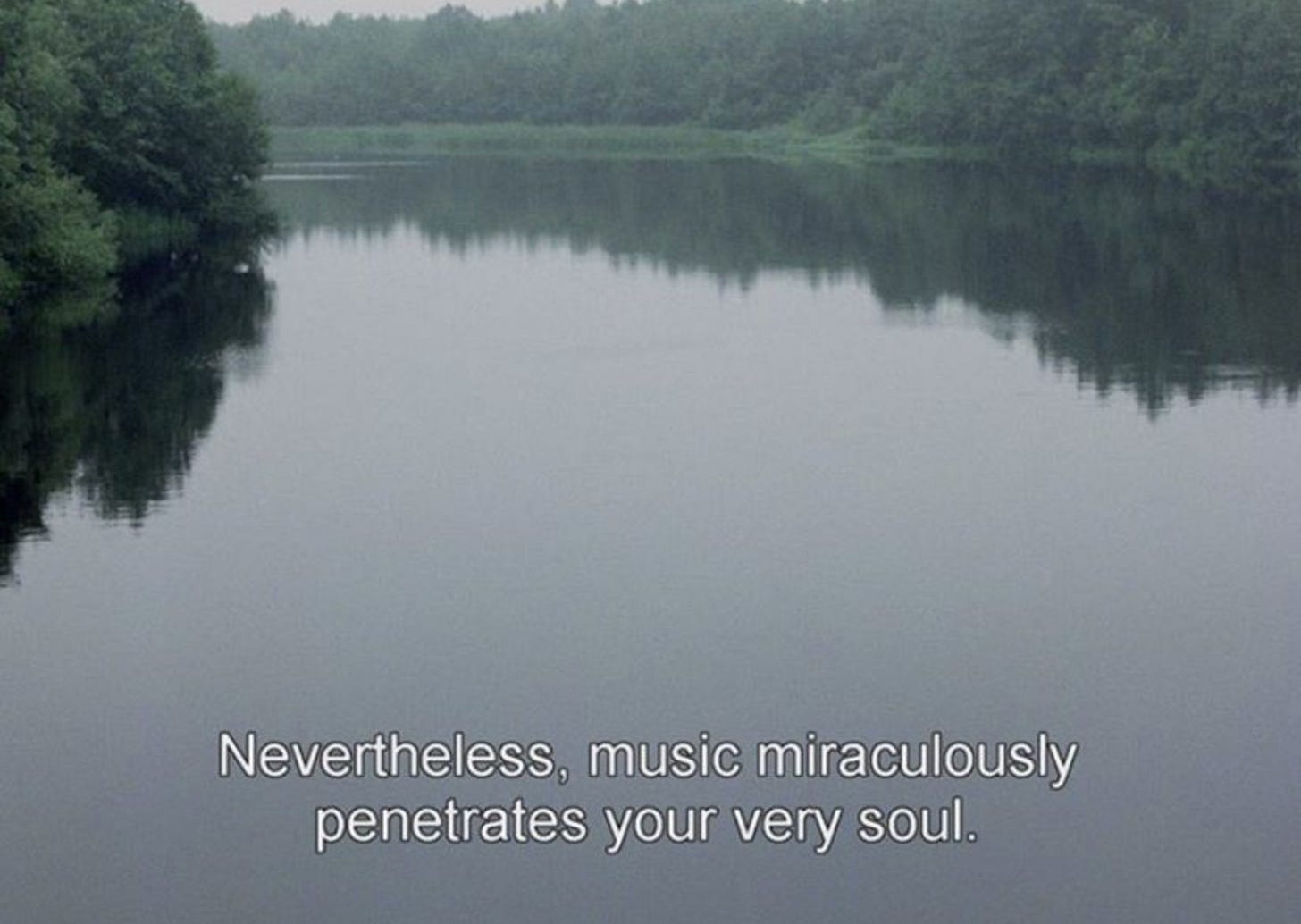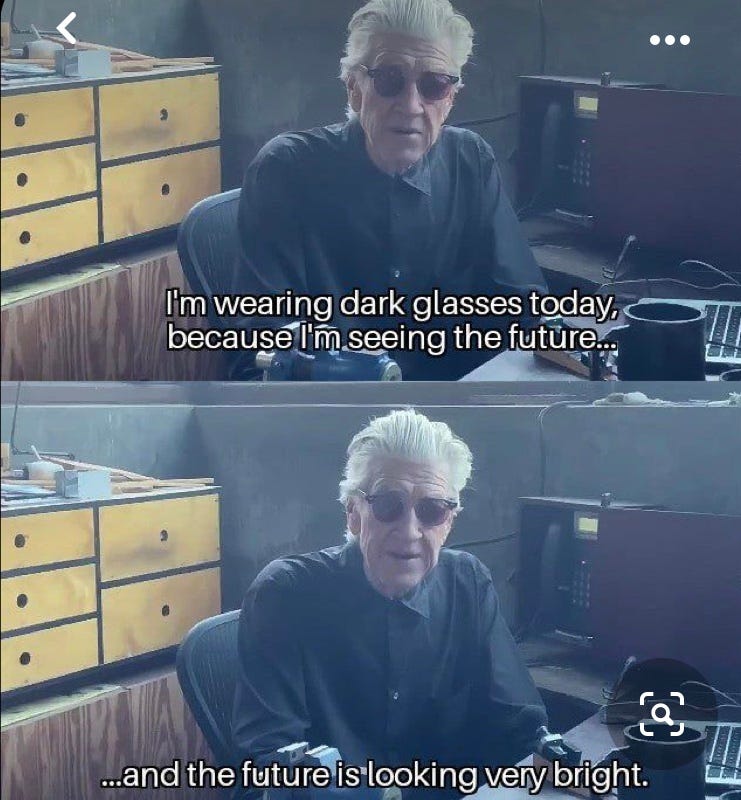Blood is a river flowing that makes itself known through stain. Blood feels like a substance of the past as present moment blood is always dying when it leaves the body. Blood has no boundaries or edges, it is uneasy, the life-force, oscillating between decay and growth. Blood was the original image of the accident. Always the thing I remember most. I couldn’t believe how fast-slow it gushed, it was thick but speedy, this deep terrible red. The shock delayed the horror. Brute sensory awareness. Hyletics is the study of matter or raw impressions of an intentional act, the abstraction from the form. When the body changes form how long does it take for memory to leave? Is it instant or gradual? When does the feeling stop? Is it painful to return? Blood from the face through the nose onto the floor. There I was witness to a severing.
Later on, I am attached to certain figures, ideals, concepts. Many things composed around not knowing how to compose, or link. Apostle melts and protects, I have an affection for the softness of the name and the purity of the vocation. To be on a mission but this time in reverse, how to make the journey un/sacred, the pursuit of goodness detached from ego action, the negation of a hero/something to be saved. How many times can the dream be set-up? I thought I knew the composition, I thought careful analysis and rational understanding would see the ingredients carried gracefully into a choice, would give a degree of agency.
Hellmouth as in the fictional landscape that sits below Sunnydale High. A library above demons to study demons, the resting place of all chaos and terror and first evil, the expanded cinematic universe of Buffy Summers and Mark Fisher, those who got cast out from an original paradigm of meaning, those searching for something beyond the going through the motions, the manipulation of desire in the name of consumption, idols, excess? The economy of want/need? From Mark,
In fact, blood follows wherever I go. I cannot escape the blood that stains my sheets, my body, I return from trips far away with cuts and bites, I do not know where they come from. I am constantly witness to my blood across forms, I watch it change quality as it leaves-
These are songs written towards love but not love songs. This is the space of entropia, the no place of measured-chaos-disorder-schizophrenia, as in the subject, the reason, the variable. The brother, closest in blood, farthest in spirit, the futile wish of reunion, the desire to return to something before first knowledge, maybe the ecology of Artaud’s void. How to reconcile my absence of him, when we turn away from each other’s conscious existence, when our realities no longer cross, when our truths no longer align to make up the same world.
And like him and I, some songs are twins, two poems that sit and talk back to each other. Two expressions to match each other in their difference of the same. How does grief change our perception of time? Each thing will fade and morph, becoming palimpsests. Like Brian Massumi’s analogues, the translation of one thing into another, how impression paints feeling in sound and image,
It is not an analog in the everyday sense of a variation on a model. Here, there is no model. Only infolding and unfolding: self-referential transformation. The analog is process, self-referenced to its own variations. It resembles nothing outside itself. A topological image centre literally makes the virtual appear, in felt thought. It is more apparitional than empirical.
There have been times in my life, when things have been at their most frightening, where I would cycle into an anxious spiral that my brothers schizophrenia would psychically transmit to me through our twin bond. When he was in his coma we had a certain synchronicity of feeling that I cannot explain. His eyes closed the way my eyes closed. His brain was inside some sort of inferno, particularly designed for madness, and for him it seemed, and so always I ask myself, why him? Why not me? That summer, the weight, the dreamland, the forgetting, the departure from anything concrete or tangible. The long hallways. The sky. For twelve years I’ve watched him spiral in and out of psychosis. He has recast my senses in multiplicity, everything is touching everything else, I am/not him, I am. Even writing this feels like I’m betraying him somehow. Feels like I’m attaching the trauma to my identity. I never wanted to do that. But in many ways he is the original analogue of these songs.
After all this time, I find myself drawn to the philosophical concept of schizophrenia as an alternative mode of thinking-feeling-understanding, a framework for knowing that could enable a broadening of imaginative capacities. A departure from the linear, rational, solar into the intuitive, multiple, lunar. A rhizomatic map of sense-experience. Free and un-free given that Schizophrenia as mental illness has rendered my ability to properly communicate with my brother mute. I can watch him forever, I can yell and cry but I can never be with him, because in many ways I do not see him. I cannot see his pain, his void, all I can feel is how he creates it inside me. My love for him remains in a container. It too cannot be witnessed because we do not see each other, and so we swim always around or worst of all right through one and other.
Sensation, always on arrival a transformative feeling of the outside, a feeling of thought, is the being of the analog. It is matter in analog mode. This is the analog in a sense close to the technical meaning as a continuously variable impulse or momentum that can cross from one qualitatively different medium into another. Like electricity into sound waves. Or heat into pain. Or light waves into vision. Or vision into imagination. Or noise in the ear into music in the heart. Or outside coming in.
Brian Massumi, Parables For The Virtual, pg. 135
For so long I tried to write about my relationship with him, I tried to make something cleansing and true and artistic out of the pain. It took a long time to realize that it’s never a decision in that way, when it comes I don’t remember how it got there, because it arrives from a place without rationality, one that is very real, but hidden as it lives in its own abject brutality, that wonky fiction-truth territory that trauma creates in the body-spirit.
Harbour as in a place, a colour, someone you almost loved, a transformative power to access something that moves, something that can transpose and take care of you when your previous ways of knowing fail you.
A poem by Anne Carson from The Float Anthology (Powerless Structures Fig. II)
I love this sentiment from Gillian Rose. Thanks Jules. Following from the Russian monk Staretz Silouan, the phrase goes “keep your mind in hell so you don’t despair.” Michael Wood’s reflection on Rose in his introduction to Loves Work ,
If you can weather hell, he appears to be saying, and not despair in the process, you will be saved. By contrast Rose turns hell into a staunch refusal of despair. To be afraid of hell is to lose all practicable hope, to seek to avoid the dark violent moments that mark all real life. To inhabit hell, to keep one’s mind there, is to find the hope that is not the opposite of devastation but its complement….
I found something I wrote a while ago, reading it feels like I’m reading a character, a reflection of previous self, I’ve bolded the words I think I was trying to say, before everything else filled out the gaps,
“Taking a step back, obviously frustrated by the glow of the town with all its light, I wanted a witness but I’m not sure if it was something to inhabit or conjure. More than anything else, I needed some angel from above to tell me I was doing it alright, alright, the delicacy of silence…this doesn’t make any sense, I scream, you scream, and we are strung out like something non-sentient, an accessory to time and nobody can keep it still, I can’t open my mouth, where do the impressions rest after they’ve made their mark? How do they extricate themselves from the boredom, the beauty, the mundane-chaotic? The excuse of psychological boundaries, when did we ever think we really knew what we wanted?”
How long do we have now? Who is it we are waiting for? How do we distill the energy of the circus? And the encounter? How does time die? And with it self-knowledge? How do we respond to the slime, care for the grotesque? The harmony? And will we remember our lives? Will we remember all the attempts we make on our life? I hear Chekhov’s Sonya,
“What can we do? We must live our lives, and when our final hour comes we shall meet it humbly and there beyond the grave we shall say that we have known suffering and tears, that are our life was bitter and God will pity us, ah- then dear uncle we enter on a bright and beautiful life- we shall rejoice and look back upon our grief here. A tender smile - and - we shall rest…”
Uncle Vanya, Anton Chekhov
It’s important that things remain unclear, the muddy prints are part of the clarity, our desires belong to ambiguity, no thinking of today, Bachman’s today is not to-day it cannot be towards the feeling, the drifting insanity, in-sanity, depart, departing,
She saw the light before it saw her and that was certainly her greatest strength in the whole debacle. Spectral bliss, less is more, come to play and pass away. Didn’t you ever just want to tell that voice to shut up? To store itself , locked up, keep running, treat her like that tower you fear. I won’t hurt you, or at least if I do it’ll be in the name of something better. I’ll promise to stay awake. Don’t tell me you’re a maniac, speak the language, listen to the void, hold on tight for some facsimile of prayer, feel it embodied before knowledge becomes self aware, you had to move through all this just to get to that, and still it may remain empty of meaning, still it may keep itself hidden from you. But it all lives, the Eco-system continues to surprise itself, and the beauty of the intricacy is so full of pleasure…nothing is just about one thing.
You can listen to and the record and buy tickets to upcoming gigs here. And you can watch things here. If you would like to purchase a CD or a vinyl just reach out to me!
Sharing this writing is confusing for me and I don’t know if it’s right to talk about something so personal in this way. But not contextualizing the album doesn’t feel right either. Maybe it’s all too much, but I guess that’s always been the case with me.
It is a strange and gratifying experience to share this work with you. It would not have been possible without the warmth, encouragement and collaboration of these dear people. There are so many I fear I might forget someone so please forgive me if I do. Thank you to my Mum, Dad, Jamie, Chris, Devlin, Jason, Hannah, Antonia, Erica, Jules, Joseph, Eli, Claire, all my brothers, Oma, Slone, Ali, Jessica, Sarajane, Christianne, all my grandparents near and far, all my music teachers throughout the years, May, Julia, Gretchen, and all my life teachers who I continue to meet everywhere everyday. Thank you so much to the Canada Council For The Arts and FACTOR for supporting this project.
Thank you for reading and listening to the music. It means a lot to me. I hope that any resonances from the album transpose through the senses something you can take with you as your own analogues of experience.
Till the second incarnation,
Sara May
<3













